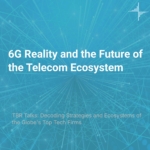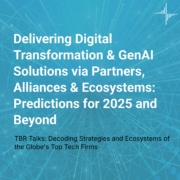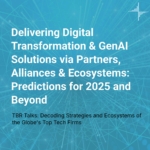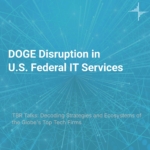6G Reality and the Future of the Telecom Ecosystem

TBR Principal Analyst Chris Antlitz dives deep into the stark reality of 6G rollout and the implications of the technology for telecom operators and vendors as well as other over-the-top data and service providers. Additionally, Chris discusses the implications of these investments for consumers, enterprises, governments and IT vendors.
Listen and learn with TBR Talks!
Submit your Key Intelligence Questions for Patrick and his guests
Connect with Patrick on LinkedIn:
Connect with Chris on LinkedIn
Learn more about TBR at https://tbri.com/
TBR Talks is produced by Technology Business Research, Inc.
Edited by Haley Demers
Music by Burty Sounds via Pixabay
Art by Amanda Hamilton Sy
6G Reality and the Future of the Telecom Ecosystem
TBR Talks Host Patrick Heffernan: Welcome to TBR Talks: Decoding Strategies and Ecosystems of the Globe’s Top Tech Firms, where we talk business model disruption in the broad technology ecosystem, from management consultancies to systems integrators, hyperscalers to independent software vendors, telecom operators to network and infrastructure vendors, and chip manufacturers to value added resellers. We’ll be answering some of the key intelligence questions we’ve heard from executives and business unit leaders among the leading professional IT services and telecom vendors.
I’m Patrick Heffernan, Principal Analyst and today we’ll be talking about 2025 predictions for 6G with Chris Antlitz, Principal Analyst for TBR’s Telecom Practice.
6G Capabilities
Chris, good to see you again. Thank you for coming in. A lot of fun doing these podcasts with you, because I feel like the telecom space is something that, I never stop learning about because I clearly don’t know enough about it and it’s changing- for such a huge industry it seems to be changing a lot, especially in the last couple of years. I know we’ve had some discussions after the trips you’ve taken to the big 6G summit. And I know we chatted back in November, but you since then came out with the Predictions document around 6G and talked about where you saw- where you and our colleagues here TBR saw the market going.
And one of the things you talked about was, you mentioned in the piece was, you know, will 6G, the open question of whether or not 6G will be a brand only or a legitimate set of truly differentiated features and capabilities that bring value. And I think you meant bring value for the CSPs, not for the entire market as a whole. Or did you mean for the whole market? And, do you think it’s just going to be a brand, or do you think it is going to be an actually legitimate set of truly differentiated features and capabilities?
Chris Antlitz, TBR Principal Analyst: Yeah, so that statement I made in the special report was specific to the communication service providers or CSPs. But, 6G will have capabilities that will be broadly used even beyond the telecom industry. You can think about enterprise capabilities for industries. You could think about, public sector opportunities for mission critical communications. Think about the blue light services and ambulatory and, you know, there’s defense opportunities there. And, it’s much broader than just telecom.
The evolution of connectivity
Patrick: Right. And so I was going to get to the government part later, but let’s jump into it now because I feel like within the telecom space, but then within the broader, sort of enterprise IT space, we’ve been talking about the opportunity around government services, responses around police and fire and smart cities and all that stuff, and telecom and networking and connectivity has been a piece of that. But it always feels like it’s sort of on the horizon. Is 6G what sort of brings us to where we finally get the smart cities we’ve been talking about for a long time?
Chris: So I think that connectivity is going to evolve and be transformed, but not be the lead. It’s going to be pulled forward by the major, the bigger things that are going on. AI, quantum computing, you know, electrification of the energy grid and how that evolves over time and how that’s supported, the future of transportation. These are things that are in motion, and connectivity is a fundamental ingredient for the transformation of those things. And it’s kind of going to pull it along versus connectivity leading the way or moving at the same pace as these things. So, for example, for AI, the data center, concept of a data center and how that data center interacts with this environment, like from an energy grid standpoint, what is running inside of that data center is changing, the architecture of the network fundamentally changes from a CPU based data center to a GPU based data center.
Patrick: Right.
Chris: And like right there, that is forcing the connectivity to evolve.
Patrick: Right.
Chris: It’s forcing it, but it’s coming from the AI side not being led forward by the, you know, the telcos, if you will.
Patrick: Right. But there is no there’s no data center and there’s no IoT and there’s no- there’s nothing without connectivity. So, I get where these, quantum and other technologies will be pulling through connectivity because they don’t work without it. But if the ROI on the investment in connectivity isn’t there, then how do we get the connectivity that’s going to enable those? It’s the chicken and the egg. But even more than that, it’s a really expensive one, whether you start with one or the other. But you have to have them both. So how do you see whether it’s 6G or just the telecom space generally or 5G and everything, how do you see that that struggle to get the return on investment? And maybe is that where government comes in? Is that where government has to take a more aggressive role?
The new business model
Chris: Yeah, I think government is going to take a more aggressive role. I mean, we saw some of this with 5G. We saw all kinds of stimulus and other programs that came up to facilitate 5G ecosystem development, to varying success. But I think, with regards to the ROI, the business model of telecom needs to fundamentally change. The hyperscalers have already figured out what the new business model is, and the business model revolves around the data itself, not the transmission of the data, which is the connectivity, the pipe model, the utility model.
Patrick: Right.
Chris: That’s what the telecom ecosystem is locked into, unfortunately, that’s what they’re locked into. But the OTT players, like the hyperscalers and the Netflix’s of the world and the Ubers, they are in the data business and they use the pipes to transmit the data and the value that comes through that data, so that how the connectivity is thought about in terms of the broader ROI equation, it’s much more than just the connectivity. You have to look at the entirety of the business model and what is the value of the data in that context.
Who will succeed?
Patrick: So, you mentioned Uber and Netflix, two companies that did not exist, whatever, 15, 20 years ago. But have competitors that have existed since they were founded as well. Are there companies that you are looking at now in the telecom space that you think could make that shift in their business model? Are there any companies that stand out when you look to- starting now and looking five years out, do you say these are the companies that that we have traditionally covered? And I’m not going to name names. I’ll leave that up to you. But who you think are actually going to be able to make that business model shift and succeed?
Chris: Of the telcos?
Patrick: Of the telcos, yeah.
Chris: Yeah, there’s two that come to mind. One is Rakuten who is a hyperscaler that’s trying to transform the telecom business model.
Patrick: Yeah.
Chris: And they’ve had mixed success. The telco that is a traditional telco that I actually think is going to make that jump is Reliance Jio in India.
Patrick: Hm
Chris: Yeah, they’re one of- it’s a very small list of companies I think will actually make that jump.
Patrick: What is it that Reliance Jio has that a traditional telco doesn’t have.
Chris: Well one of the things they have is very little legacy infrastructure. When they started in 2016, they started with LTE. They started with an all IP based network,
Patrick: Okay.
Chris: And most telcos in the world have years of legacy technology that have been band-aided and carried forward into new generations and re-patched together. That’s a limitation to telcos breaking free of that. Reliance Jio doesn’t have to break free from that. They’re starting from day one with basically a greenfield architecture.
Patrick: Okay, okay. And then Rakuten. And know they’re not India based where they’re based?
Chris: Japan.
Patrick: Japan, okay. Is there anything about like the investments by, for Rakuten or for Reliance Jio, are they in any way- or the investments coming from, or their success dependent on, government intervention that’s helped them out? Or have they been, sort of not as dependent on that.
Chris: So, Reliance Jio benefits from protectionist policies in India where there’s a lot of restrictions on who can play and what level they can play in the Indian market. So that is a huge help. But in terms of direct capital injection, we don’t really see that in either country.
Patrick: Yeah. So, at Mobile World Congress are you expecting sort of a full embrace of everything you’ve talked about with respect to the need to change the business model? Or is there still- out of all the people who are attending, is there still not a welcome recognition that things have got to change?
Chris: So, the urgency continues to build, and I’ve been hearing for years about how the telcos are going to change. They’re going to do this, they’re going to do that. And they tried, some of them have tried various things, but they never- they never were successful at the level they needed to be, to really make that transition.
Patrick: Yeah.
Chris: So, for example, like AT&T, they tried, they did try and they spent a lot of money trying.
Patrick: Yeah.
Chris: And they wound up undoing a lot of what they did because it wasn’t working out.
Patrick: Yeah.
Chris: So, you know, it’s not an easy situation. What I’m seeing the telcos doing is reverting back to their- what they know how to do best, and that’s connectivity.
Patrick: Yeah.
Chris: Running the pipes. Building the pipes and running the pipes.
Patrick: Right.
Chris: And they are- some telcos have changed their strategy now, some quite significantly, like AT&T, they are very much focused on that pipe. They are back to focusing on the pipe.
Patrick: Yeah. And if they can do it well and do it efficiently then there’s still money for them to be making there. It’s just not going to be the same kind of growth that they were probably anticipating a few years ago. Right?
Chris: Yeah. That limited- more limited on the growth side. More on the cost savings side and building a very profitable network. You know, AI is one of the technologies that’s going to help them achieve those goals. Like, that’s a whole step function of lower cost for them to run their business.
Patrick: Right, right.
Chris: That if you think about their shareholders like they’re looking for earnings per share growth. Yeah, they want top line too, at the end of the day they want the earnings per share.
Patrick: Right.
Chris: And that’s what the telcos can bring with these new technologies. They can invest and get cost efficiencies. And they can pass that down to the EPS line.
Ericsson, Nokia and Huawei
Patrick: So, two other companies I want to ask about before we wrap up, because these are the companies that when I think about connectivity in the telco space, are the ones that I’ve worked at the most, and that’s Ericsson or Nokia. So where do you see them in the next 3 to 4 to 5 years? How much of their story is a 6G story? How much of their story is dependent on, both of them being able to change their business models to what the realities are going to be in a few years.
Chris: So, their hand’s kind of being forced. I mean, if you look at the balance of power is shifting and RAN, for example, with Ericsson emerging as the primary RAN supplier of the entire world, and Huawei, of course, is there as well. But those companies are, in their DNA and their heritage is hardware engineering, and they do it really, really well.
Patrick: Right.
Chris: The problem is these new network- the new architect for the network, the engineering is still important for the hardware. It will always be important, but the emphasis shifts to the software, and disaggregation, virtualization, all of these, these, technology transitions are changing that business model.
Patrick: Yeah.
Chris: So, you have Ericsson and Nokia and the other hardware centric vendors like they are, you know, they’re facing kind of a crisis moment because, you know, 6G, it’s likely not going to be- it’s going to be an underwhelming CapEx cycle. And it’s going to be, honestly, a lot of it’s going to be software updates to the 5G infrastructure, to the 5G hardware, where you’re doing software updates so that you have better algorithms, you know, maybe some new antennas and, you know, some of that, of course, but it’s going to be much more emphasis on the software and the integration of software, and the cross integration of that telco software stack with other- with partner software stacks and platform providers and things. That’s where you’re going to get the value as this market moves forward.
Patrick: Right. So those are two companies though that have gone through significant business model shifts in the last 3 or 4 or 5 decades. I mean, Ericsson and Nokia have performed well enough to still be around and still be the dominant players in what they do. So, do you anticipate that they’re going to figure out the right strategy to make it through the next couple of years? Or do you think there’s going to be a real reckoning for both of those companies? And Huawei too, lets throw Huawei into the mix, although I know that’s it’s a very different business model and opportunity they have.
Chris: Yeah. So, you have the geopolitics aspect. But yeah, I mean nothing bad is going to happen to Ericsson or Nokia, you know, they’re going to be around 4 or 5 years from now. But they might look different and they might be smaller than they are today. Potentially significantly smaller through divestments, or some businesses are going to, you know, they’re going to fizzle out over time or just- those are aspects that are in play.
Patrick: Yeah. Yeah.
Chris: They’re probably not going to be significantly bigger than they are today unless there’s some big M&A events, which I know Nokia has been acquisitive lately with Infinera. But you know, situations like that, you know, that’ll change the composition of those companies as well.
Patrick: That’s a challenge too, if you don’t do acquisitions all the time, it’s harder to do acquisitions. I mean, that’s what we’ve learned over and over again from the companies that we cover. It’s a muscle memory that if you don’t exercise it, you’re not good at it. And so, for a company to sort of say, well, acquisitions is going to be our growth strategy, that can be its own set of challenges.
Chris: Yeah. And you know, with tech just building on that- with tech, you know, you’re buying into some company, you’re buying into their IP.
Patrick: Yeah.
Chris: And technology is fickle. It changes. What happens if you pick wrong.
Patrick: Yeah.
Chris: And the valuations are high. There’s a lot of risk.
Patrick: Yeah.
Chris: There’s a lot of risk.
Metaverse
Patrick: What happens if you pick wrong, for example, metaverse which we talked about 4 or 5 years ago, and it hasn’t really turned out to be- and yet 4 or 5 years ago we were not talking about a, I don’t want to say quantum that’s the wrong way to say it, but a leap in artificial intelligence that I don’t think anyone expected four years ago, or at least nobody was talking about it.
Chris: The metaverse stuff. Have you tried the Apple- the headset.
Patrick: Not yet.
Chris: You have to try it. You got to try it.
Patrick: I take that back, I was at a PwC event where they had it, and I could change- I could listen to music and change it just by talking to it, which was kind of cool, but it didn’t do anything other than that that I could tell.
Chris: So, I did the demo, the formal demo they have at the store and, the metaverse is going to happen. The question is, when is it going to happen.
Patrick: Yeah. Well, one of the quarterbacks in the playoffs, again I’m dating this by saying it, but the quarterback for the Washington Commanders has been using a VR headset to train. And he plays it at 1.5 speed so that when he’s actually playing the game physically on the field, it seems slower than it does in his training. So that might be the most compelling case. And I can understand where there’s a massive runway of opportunity for companies to come in and can say, you know, we’re going to help athletes train at that much more elite level. So- but is that a 6G opportunity? I don’t even know.
Chris: Yeah. We’ll have to see.
Final thoughts
Patrick: We’ll have to see. Chris, thank you so much, this was a lot of fun as always, appreciate it. Next week, I’ll be taking a quick break from our predictions series to speak with TBR Senior Analyst John Caucis and Analyst James Wichert about the current state of the federal market. Don’t forget to send us your key intelligence questions on business strategy, ecosystems, and management consulting through the form in the show notes below. Visit tbri.com to learn how we help tech companies large and small, answer these questions with the research, data and analysis my guests bring to this conversation every week. Once again, I’m your host, Patrick Heffernan, Principal Analyst at TBR. Thanks for joining us and see you next week.
TBR Talks: Decoding Strategies and Ecosystems of the Globe’s Top Tech Firms
Join TBR Principal Analyst Patrick Heffernan weekly for conversations on disruptions in the broader technology ecosystem and answers to key intelligence questions TBR analysts hear from executives and business unit leaders among top IT professional services firms, IT vendors, and telecom vendors and operators.
“TBR Talks” is available on all major podcast platforms. Subscribe today!

 Technology Business Research, Inc.
Technology Business Research, Inc. Technology Business Research, Inc.
Technology Business Research, Inc. Technology Business Research, Inc.
Technology Business Research, Inc.